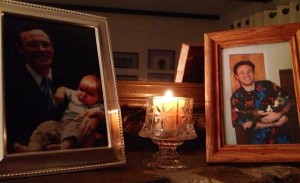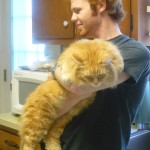You know when something happens and in that moment you recognize a truth, but you can’t define that truth? I have mulled over such a moment for three months, trying to define it in my head. December 9th, 2012, was The Compassionate Friends Worldwide Candle Lighting for children who had died. Our local chapter of The Compassionate Friends was holding a service, but I was only four days post-op my second foot surgery, so we did what thousands of other families did who could not attend a service, we lit a candle at home. Many thanks to family and friends who at 7 PM also lit a candle in remembrance.

I was unprepared for the rush of emotion that lighting a single candle would bring. I could imagine a giant wave of light coming over the world as candles were lit to remember our children. We had been given a beautiful beeswax votive from a very dear soul, the candles are made by Orthodox nuns in Washington State. Pure, 100% beeswax, warm and rich, with such a clear light. Neither one of us could really speak, so you light the candle in silence and watch it illuminate the darkness around it. That small votive burned for 19 hours, we watched it through the night and into the early afternoon. And you weep, you weep for the loss of your own child, you weep for the loss of other children who have become dear to your heart after meeting their bereaved parents, you weep for the parents who may have lost a child that very day.
We left the pictures of Justin and the candle holder on the mantle, reluctant to break up what seemed to belong together One night that week, Doug placed a beeswax tea-light in the holder and lit it, silently. For all its quiet, it was such a moment of intense communication, so singular in its existence, unlike anything else I had experienced. I knew it was profound, I just had no idea what it was or what it meant.
I was reminded of the four points to Worden’s “Tasks of Mourning”, a task-focused model for grief work. One of his points is emotional relocation. The first time I read that, it made no sense, could not even comprehend what that task would be, or what it would look like. Didn’t get much further the second, third, and subsequent readings of the task, but it stuck with me. It is why grief cannot be rushed, it cannot be scheduled, the tasks unfold themselves and in no particular order, and once is never enough – this work is fluid, dynamic, and lasts a lifetime.
The best I can articulate this emotional relocation is that where once we related to Justin in a very sensory way, Doug and I spoke of him in an active present-tense dialogue. Now, we had to “relocate” Justin. He will never again walk through our door, we will never again speak of him in an anticipatory way of his coming home, finishing grad school, we will not have that sense perception of him. We cannot touch him, smell the fresh scent that was his, or hear his voice. Can I just say that this “relocation” does not happen overnight. Good communication is always a challenge for any married couple, sometimes even talking about our children can strain our communication skill set, try talking about your dead child…yeah, not really covered in any book on marriage that I have read.
So now you take two overtired, shell-shocked people and expect them to master and process what has happened in their lives in short order. These are incredibly complex steps to experience, you must go through the pain, you cannot go around the pain. We yearn for what might have been, and at the same time we feel Justin’s hand slipping from our reach. That is what it feels like. We are hurtled along in a trajectory away from him, you hold on to any shred of him that you can perceive, and then his hand is gone. You grasp for him, but he is gone. You hang your body over the abyss and search for him to no avail. Physically, brutally, Justin was snatched from our life, but emotionally, his hand was still in ours, as time passes, that hand slips away and it is terrifying. What will you have left of him if you let go? How will you remember him? It is fresh grief still and all over again. You back away from the abyss, color still hurts your eyes, sounds are still overly loud to your ears, but your perception is clearer, you know the value of time, and are far more purposeful in how you reinvest your energy. Your skin feels too tight, and you know that a different you is emerging. You recognize the same metamorphosis in your spouse. This is a crucial time for “new” parents. And we are new parents, we have a surviving child who we interact with on a physical, sensory plane, and we are parents to a dead child, who we are slowly learning to build a new relationship that involves commemorating his life.
Commemoration and ritual is our new language, our new dialogue, with each other, and in a way I cannot put into words, with Justin.
More on that dialogue tomorrow in Part Two.



Wow so much of this post hit home with me. Having one son here and one son in heaven is just to hard. I struggle everyday. Kenny is in my head 24-7 and it’s just impossible to handle sometimes. I do feel blessed that I have Scott here and he lives 10 minutes away. He has been amazing and without him I don’t know where we would be. Although he struggles to we all just hold on to each other and try to live this new life without Kenny. Like I said every day is a struggle. Thanks for your amazing posts you have gift with words. Hope to get together sometime soon!